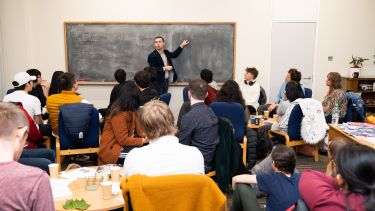Explore this course:
Applications for 2024 entry are now open. Apply now or register your interest to hear about postgraduate study and events at the University of Sheffield.
Statistics
School of Mathematics and Statistics,
Faculty of Science

Course description
This nine-month part-time distance learning course covers the relevant first-year undergraduate mathematics, and the relevant first and second-year probability and statistical theory. It runs from late September until early June. Exams are online, so you won't need to visit Sheffield.
There are three modules and you'll either be given directed reading from standard textbooks or a fully comprehensive set of course notes, depending on the module, as well as examples and exercises to work through. Tailored course material will also be made available online including additional notes and video lectures.
Our lecturers will give you feedback and comments on your work and each module has an online forum for discussions. You'll need to dedicate around 20 hours a week to your studies.
Progression
An average final mark of approximately 65 per cent on the Graduate Certificate, with at least 60 per cent in each of the three modules, will usually allow you to progress onto the MSc Statistics or MSc Statistics with Medical Applications, provided you meet the University's English language requirements.
Modules
The content of our courses is reviewed annually to make sure it's up-to-date and relevant. Individual modules are occasionally updated or withdrawn. This is in response to discoveries through our world-leading research; funding changes; professional accreditation requirements; student or employer feedback; outcomes of reviews; and variations in staff or student numbers. In the event of any change we'll consult and inform students in good time and take reasonable steps to minimise disruption.
Open days
An open day gives you the best opportunity to hear first-hand from our current students and staff about our courses.
Find out what makes us special at our next online open day on Wednesday 17 April 2024.
You may also be able to pre-book a department visit as part of a campus tour.Open days and campus tours
Duration
Nine months, part-time – you'll need to dedicate around 20 hours a week to your studies
Assessment
Around 20 per cent of your assessment will be based on coursework, with the rest based on your final exams.
Your career
This course is designed to prepare you for a masters degree in statistics here at the University of Sheffield.
Employers that have hired graduates from our School of Mathematics and Statistics include Amazon, Barclays, Dell, Goldman Sachs, IBM, PwC, Sky, the NHS and the Civil Service.
Department
School of Mathematics and Statistics
The School of Mathematics and Statistics is one of the biggest departments at the University of Sheffield. It’s home to more than 50 academic staff with expertise across many areas of pure mathematics, applied mathematics, probability and statistics. We aspire to be an inclusive and welcoming environment for all who enjoy mathematics.
Our mathematics and statistics researchers work on a wide variety of topics, from the most abstract questions in algebraic geometry and number theory, to the calculations behind infectious disease, black holes and climate change.
In the Research Excellence Framework 2021, 96 per cent of our research was rated in the highest two categories as world-leading or internationally excellent.
Staff in the School of Mathematics and Statistics have received honours from the Royal Society, the Society for Mathematical Biology and the Royal Statistical Society, who also provide professional accreditation for our statistics courses.
With the support of the London Mathematical Society, we are an organiser of the Transpennine Topology Triangle – a key focal point for topology research in the UK.
We also have strong links with the Society for Industrial and Applied Mathematics, the Institute of Mathematics and its Applications, the European Physical Society and the International Society on General Relativity and Gravitation.
Entry requirements
Minimum 2:2 undergraduate honours degree in a quantitative subject (e.g. biochemistry, biomedical science, computer science, economics, medicine, engineering) and at least grade B in A Level mathematics, or equivalent.
- Preparing for the course - reading material
-
Below are three of the core texts for A Level mathematics. Next to each one are chapters covering material you should be familiar with before you start the Graduate Certificate. If you are unfamiliar with any of these topics you should work on this material before you start the course. The titles are from the AS and A Level Modular Mathematics series of the Edexcel exam board:
- Core 1 (ISBN 978-0-435519-10-0) – 1: Algebra and functions; 2: Quadratic functions; 3.1-3.3 Equations and inequalities
- Core 2 (ISBN 978-0-435519-11-7) – 8: Graphs of trigonometric functions
- Core 3 (ISBN 978-0-435519-09-4) – 3: The exponential and log functions
If you want to read some material before you start we recommend you look at some of these sections, which will be covered in the first half of your course:
- Core1 (ISBN 978-0-435519-10-0) – 3.4 & 3.5: Equations and inequalities; 6: Sequences and series; 7: Differentiation; 8: Integration
- Core2 (ISBN 978-0-435519-11-7) – 5: The binomial expansion; 7: Geometric sequences and series; 9: Differentiation; 11: Integration
- Core3 (ISBN 978-0-435519-09-4) – 2: Functions; 8: Differentiation
- Core4 (ISBN 978-0-435519-07-0) – 5: Vectors; 6: Integration
- Statistics1 (ISBN 978-0-435519-12-4) – All
- Statistics1 (ISBN 978-0-435519-13-1) – All
Overall IELTS score of 6.5 with a minimum of 6.0 in each component, or equivalent.
If you have any questions about entry requirements, please contact the department.
Fees and funding
Apply now
Apply using our Alternative Routes and Programmes Online Application form.
Select programme code MASU34
Contact
postgradmaths-enquiry@shef.ac.uk
+44 114 222 3789
Any supervisors and research areas listed are indicative and may change before the start of the course.
Recognition of professional qualifications: from 1 January 2021, in order to have any UK professional qualifications recognised for work in an EU country across a number of regulated and other professions you need to apply to the host country for recognition. Read information from the UK government and the EU Regulated Professions Database.

